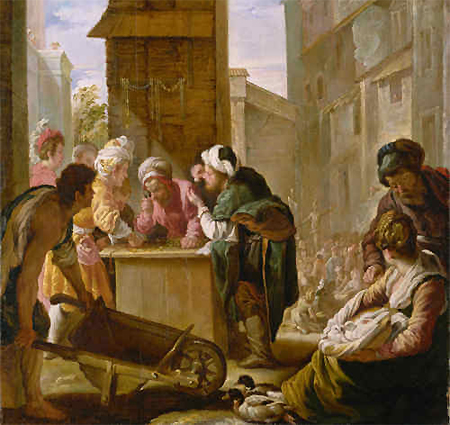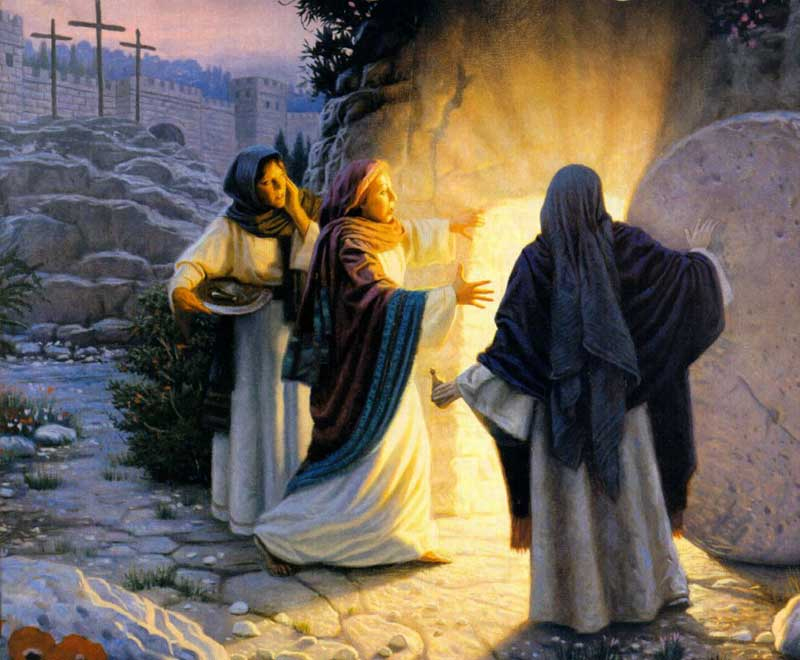Christian Art | Parables Of Jesus | Kingdom Of Heaven | Pearl Of Great Price
Matthew 13: 44-53 | Week 17 Wednesday & Thursday (King James Audio Bible KJV)
44 ¶ Again, the kingdom of heaven is like unto treasure hid in a field; the which when a man hath found, he hideth, and for joy thereof goeth and selleth all that he hath, and buyeth that field.
45 ¶ Again, the kingdom of heaven is like unto a merchant man, seeking goodly pearls:
46 Who, when he had found one pearl of great price, went and sold all that he had, and bought it.
47 ¶ Again, the kingdom of heaven is like unto a net, that was cast into the sea, and gathered of every kind:
48 Which, when it was full, they drew to shore, and sat down, and gathered the good into vessels, but cast the bad away.
49 So shall it be at the end of the world: the angels shall come forth, and sever the wicked from among the just,
50 And shall cast them into the furnace of fire: there shall be wailing and gnashing of teeth.
51 Jesus saith unto them, Have ye understood all these things? They say unto him, Yea, Lord.
52 Then said he unto them, Therefore every scribe which is instructed unto the kingdom of heaven is like unto a man that is an householder, which bringeth forth out of his treasure things new and old.
53 ¶ And it came to pass, that when Jesus had finished these parables, he departed thence.
The three parables follow one upon another, and they are addressed in Matthew’s Gospel to the disciples, rather than to the crowds. The parables of the hidden treasure and of the pearl clearly develop upon the same theme, and then the parable of the net follows and expands upon their meaning, magnifying it, while also relating to the disciples’ apostolic mission. We are taught through each parable of the supreme value of the gift of grace and of the Kingdom, and also of judgement, the rightful valuing of our gifts such that we live in accordance with God’s will.
In the parables of the hidden treasure and of the pearl, the man searching the field and the merchant both find a precious treasure which is so far beyond all that they currently possess, such that they sell all they have in order to acquire their jewel.
Nothing that has gone before matters in comparison to what they have found. They may have laboured and traded for years, all their life, but now they have found the gift of God. The man working the field may have stumbled upon his gift; the merchant may always have longed and sought for it. Both must give away everything in order to be able to be with this new treasure.
Jesus tells us that all our lives’ work, as we struggle and trade and labour and compete, are as nothing in comparison to the gift of heaven. We are warned that we could become so attached to what we have struggled to achieve in the field and the market place, that we might not sell all we have. The response of the men in the parables is a guide to us: nothing that we have achieved through our trade, through our labour, can compare to the gift Christ brings to us; we are to give all such attachments away, to become unattached to our worldly position and possessions, to give away all attachments in order to focus wholly on our true life, the hidden treasure, the precious pearl. We are to stake everything to obtain this prize.
The parable of the net builds upon these messages. God’s net is cast into the sea. We are all drawn from the sea within the net. The good will be retained; the bad will be cast away.
We are to ask, then, when we are drawn into the net, have we given everything away to have with us the hidden treasure or the precious pearl? Are we wholly dedicated to God, or have we refused to give everything to be with him? Have our lives been wholly focused on God, or have we kept something back – whether attachment to money, or the things that money can buy, or to worldly prestige, or to some other state of mind, such as a clinging to pride, or some sexual activity, or self-regard, gluttony, jealousy, envy, anger… Or have we just been too busy? Whatever the excuse might be.
Christ’s message is overwhelmingly this: the pearl, the hidden treasure, can be our own. This is treasure that is new and also old: the truth of Christ’s message holds for all times, and we can all be scribes sharing this message. All we have to do is give God everything. All we have to do is give God all.
‘For though we walk in the flesh, we do not war after the flesh: (For the weapons of our warfare are not carnal, but mighty through God to the pulling down of strong holds;) Casting down imaginations, and every high thing that exalteth itself against the knowledge of God, and bringing into captivity every thought to the obedience of Christ.’ 2 Corinthians 10: 3-5

King James Audio Bible | Endnote
Why did Jesus speak in parables?
Jesus spoke in parables as a teaching tool to impart wisdom, challenge listeners, and provoke thought.
- To teach moral lessons: Jesus used parables to convey complex moral and spiritual truths in a simple and memorable way.
- To challenge listeners: The parables often contained surprising twists or reversals, which challenged listeners to question their own assumptions and beliefs.
- To reveal truths to some, but hide them from others: Jesus explained to his disciples that while the parables would reveal truth to those who were receptive to it, they would remain obscure to those who were not.
- To provoke thought: The parables were designed to be thought-provoking and to encourage listeners to reflect on their own lives and beliefs.
What does the word parable mean?
The word parable comes from the Greek word parabole, which means comparison. In a religious context, a parable is a simple story or illustration used to explain a spiritual or moral lesson. The purpose of a parable is to help make abstract concepts or teachings more accessible and understandable to the listener.








